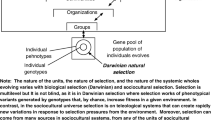Abstract
In the past couple of decades, there has been a conspicuous development in biological evolutionary theories, which are more or less different from traditional neo-Darwinism. Among them, the biological self-organization theory of Stuart Kauffman and Serial Endosymbiosis Theory by Lynn Margulis deserve most attention in two respects: one is that they provided persuasive explanations for the course of evolution different from orthodox neo-Darwinism, and the other is that their theories are considered to be applicable to certain aspects of economic phenomena. By its nature, the self-organization theory could be more applied to the rising phase of an economy, whereas the SET theory could be basically applied to the defensive case of an economy in a survival crisis. This paper first gives a brief summary of recent developments in post-Darwinist types of evolutionary theories, putting particular focus on the above two theories, and next tries an application study to analyze some empirical cases in Asian economies based on these two theories.
Similar content being viewed by others
References
Goodwin, B. (1994) How the Leopard Changed in the Spot: the Evolution of Complexity, Princeton University Press, NJ.
Ikeda, K. (1997) Goodbye Darwinism — A Lecture for Structural Evolution (in Japanese), Kodansha, Tokyo.
Kaneko, K. (2003) What is Life? — Introduction for Complexity Theory of Like (in Japanese), Tokyo University Press, Tokyo.
Kauffman, S. (1995) At Home in the Universe—The Search for the Law of Self-Organization and Complexity, Oxford University Press, New York.
Koestler, A. (1967) The Ghost in the Machine, Huchinson, London.
Krugman, P. (1996) The Self-Organizing Economy, Blackwell, Cambridge.
Margulis, L. (1999) Symbiotic Planet — A New Look at Evolution, Orion Publishing Group Ltd., London.
- and Sagan, D. (2000) What is Life?, University of California Press, Berkley and Los Angeles.
Shimizu, H. (1999) Life and its Location (in Japanese), NTT Tokyo, Tokyo.
Tominomori, K. (2001) Economics of Self-Organization and Emergence (in Japanese), Springer Verlag, Tokyo.
- (2005) Self-Organization of a New Economic Order — Based on the East Asian Quadrangle, Economic Journal of Hokkaido University 34: 215–231.
Trefil, J. (1997) Are We Unique?, John Wiley & Sons, Inc., New York.
Author information
Authors and Affiliations
Corresponding author
About this article
Cite this article
Tominomori, K. What Can Economics Learn from Post-Darwinist Developments in Biological Evolutionary Theory Represented by S. Kauffman and L. Margulis? — An Application Study in Asian Economic Systems. Evolut Inst Econ Rev 3, 71–87 (2006). https://doi.org/10.14441/eier.3.71
Published:
Issue Date:
DOI: https://doi.org/10.14441/eier.3.71




